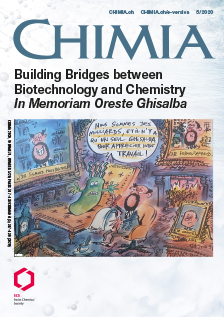Effects of Sodium Chloride on Tyramine Production in a Fermented Food Model and its Inhibition by Tyrosine-degrading Lactobacillus plantarum JA-1199
DOI:
https://doi.org/10.2533/chimia.2020.391PMID:
32482216Keywords:
Biocontrol, Dairy products, Degrading lactic acid bacteria, Tyramine, TyrosineAbstract
Tyramine is a health-adverse biogenic amine, which can accumulate in fermented foods like cheese by decarboxylation of the free amino acid tyrosine by either starter cultures or resident microbes such as lactic acid bacteria including Enterococcus spp., respectively. Our study aimed to show the effect of sodium chloride concentrations on tyramine production as well as to characterise bacterial strains as anti-tyramine biocontrol agents in a 2 mL micro-cheese fermentation model. The effect of sodium chloride on tyramine production was assayed with tyramine producing strains from eight different species or subspecies. Generally, an increase in sodium chloride concentration enhanced tyramine production, e.g. from 0% to 1.5% of sodium chloride resulted in an increase of tyramine of 870% with a Staphylococcus xylosus strain. In the biocontrol screening among lactic acid bacteria, a Lactobacillus plantarum JA-1199 strain was screened that could consume in successful competition with other resident bacteria tyrosine in the micro-cheese model as a source of energy gain. Thereby tyramine accumulation was reduced between 4% to 99%. The results of this study disclose a feasible strategy for decreasing tyramine concentration and increasing the safety level of fermented food. It is an example of development and application of bacterial isolates as starter or protective cultures in food, a biocontrol topic, which Oreste Ghisalba – in his project evaluation function of SNF and later on CTI – was promoting with great emphasis in our ETH Food Biotechnology research group.
Downloads
Published
Issue
Section
License
Copyright (c) 2020 Janine Anderegg, Florentin Constancias, Leo Meile

This work is licensed under a Creative Commons Attribution-NonCommercial 4.0 International License.







